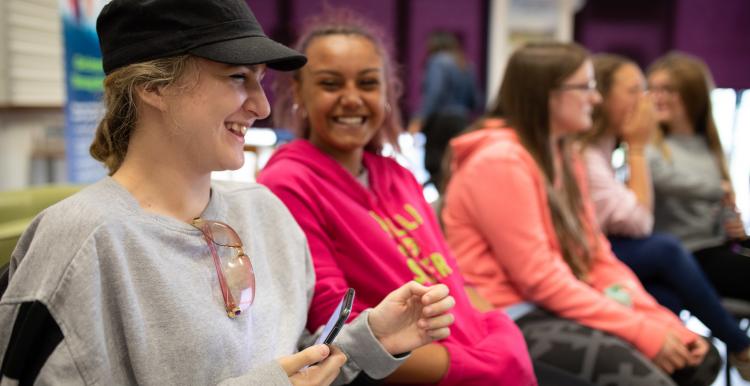Looking after a child or young person's mental health

There are times when we all feel the strain. As parents and carers, there are ways we can support children and young people to give them the best chance to stay mentally healthy.
Some children and young people have enjoyed being off school, while others will have really struggled – with the Coronavirus outbreak keeping them at home and away from friends. Others may be coming to terms with family problems, loss or changes to their living situation.
With nationwide and local restrictions being regularly reviewed, they may also have to deal with self-isolating because of an outbreak in school or another period of school closure, or have worries about getting or passing on the virus. It's still uncertain what further changes we all may face.
Feelings like these will gradually ease for most, but there are always steps you can take to support them emotionally and help them cope with problems they face.
There's support available if you feel you or they need it.
Top tips to support children and young people
1. Be there to listen
Regularly ask how they're doing so they get used to talking about their feelings and know there's always someone to listen if they want it. Find out how to create a space where they will open up.
How to start a conversation with your child
2. Support them through difficulties
Pay attention to their emotions and behaviour, and try to help them work through difficulties. It's not always easy when faced with challenging behaviour, but try to help them understand what they're feeling and why.
Help with difficult behaviour and emotions
3. Stay involved in their life
Show interest in their life and the things important to them. It not only helps them value who they are but also makes it easier for you to spot problems and support them.
4. Encourage their interests
Being active or creative, learning new things and being a part of a team help connect us with others and are important ways we can all help our mental health. Support and encourage them to explore their interests, whatever they are.
5. Take what they say seriously
Listening to and valuing what they say, without judging their feelings, in turn makes them feel valued. Consider how to help them process and work through their emotions in a more constructive way.
The Anna Freud Centre support guide
6. Build positive routines
We know it still may not be easy, but try to reintroduce structure around regular routines, healthy eating and exercise. A good night's sleep is also really important – try to get them back into routines that fit with school or college.
Signs that something is wrong
Around 1 in 8 children and young people experience behavioural or emotional problems growing up. For some, these will resolve with time, while others will need professional support.
It can be difficult to know if there is something upsetting a child or young person, but there are ways to spot when something's wrong. Look out for:
- significant changes in behaviour
- ongoing difficulty sleeping
- withdrawing from social situations
- not wanting to do things they usually like
- self-harm or neglecting themselves
Remember, everyone feels low, angry or anxious at times. But when these changes last for a long time or are significantly affecting them, it might be time to get professional help.
You know your child better than anyone so, if you're worried, first think if there has been a significant, lasting change in their behaviour.
This could be at home, school or college; with others or on their own; or in relation to specific events or changes in their life.
If you're concerned or unsure, there is lots of support out there, including professional help in the support section of this page.
MindEd for Families also has information explaining some common behavioural problems in different age groups.
Get support
Young Minds Parents Helpline
If you're concerned about a child or young person's mental health, you can get free, confidential advice via phone, email or webchat from the Young Minds Parents Helpline.
Action for Children
Action for Children has lots of tips to help you spot signs of mental health issues in children and advice on the action you can take to help.
Barnardo's
Barnardo's has set up the 'See, Hear, Respond' support hub - a dedicated service to help children, young people and their families or carers with problems caused by the Coronavirus outbreak.
Barnardo's See, Hear, Respond support hub
Barnardo's has also set up a new helpline for Black, Asian and Minority Ethnic children and families to provide support during the Coronavirus outbreak, called 'Boloh'.
The Childhood Bereavement Network
Experiencing the loss of a friend or loved one can be extremely difficult. The Childhood Bereavement Network has information and links to national and local organisations you or the child you look after might find helpful.
Shout
Shout 85258 is a free, confidential, 24/7 text messaging support service for anyone who is struggling to cope. It offers real time text and online support in the heat of the moment for young people. If you are over age 16 then text SHOUT to 85258 and they will text straight back. If you are aged under age 16 text YM to the same number 85258.
Any professional that works with children and young people should be able to help you get support. You could talk to a teacher, school nurse, social worker or GP.
Support available in Enfield
Barnet, Enfield and Haringey Mental Health Trust
Barnet, Enfield and Haringey Mental Health Trust (BEH-MHT) provide Children and Young People's Mental Health services in Enfield (CAMHS). They have a dedicated page on their website about children and young peoples mental health, in addition to information about how to get help and support.
Mind in Enfield
Mind in Enfield provide a free, confidential counselling service to anyone in Enfield aged 16+, who is registered with an Enfield GP. You can self-refer to their service by completing a form online.
Kooth
Kooth provides online mental health and wellbeing support to young people in Enfield via any internet accessible device, and an opportunity to interact in a supportive way with other young people as well as receive support from a qualified counsellor. You can find out more about how to access Kooth on their website.
Tools and resources to support an adults mental health and wellbeing
Our dedicated adults mental health and wellbeing webpage has tools and resources to support an adults mental health.

